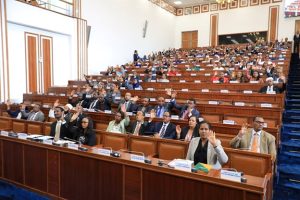
Unless the government enforces its strict legal measures and strengthens the financial institutions amid illicit financial flow, the existing serious economic crisis and the growing political unrest will continue to mushroom, so recommend experts.
For over two and half decades, about 36 billion USD has laundered to foreign countries due to the illegal financial flow, Macro Economics Expert Dr. Eyob Tesfaye recently told local media. In 2004 alone, Ethiopia was granted four billion USD in loans but over five billion USD had left the country in illicit financial flight, he indicated. For Addis Ababa University Economics Lecturer Dr. Atilaw Alemu, illicit financial flows may undertake through contraband, kickbacks, misinvoicing, and corruptions among others. Moreover, the foreign currency that has been earned from trade, loan and remittance has been going into the hands of individuals and smugglers than transacting via financial institutions, he states.
Between 2004 and 2013, Ethiopia had lost 26 billion USD through illicit financial flows and the UNDP report of 2014 indicates that the country loses about 3 billion USD per annum, Wollo University Law Lecturer Temesgen Tessema says. Over the past five months, the government has seized about 62.9 million Birr worth of foreign currencies from illicit financial flow, indicates the information from the Ministry of Revenues.
The illicit capital flow has potentially put the country to economic, social, and political crisis. The impact will affect every individual in terms of low per capita income. And it has also made the country to lose significant money to its development projects, according to Temesgen.
On the other hand, some of the criminals used the money to finance conflicts in the country. Currently, the ongoing illegal armament trafficking is destabilizing the country in various areas including, Amhara and Beninshangul Gumz states, he underlines. Ultimately, the criminals abuse the money to disrupt the market, send it abroad for personal comfort and money laundering, or they employ it in the country to commit various crimes and even financing conflicts, believes Dr. Atilaw.
Due to this, the country has been exposed to forex crunch which makes difficult the import of various goods and commodities including food, pharmaceuticals, and other inputs in various sectors, he notes. Similarly, various mega development projects including the Grand Ethiopian Renaissance Dam are making steady progress, he says. In the other way, there is no international agreement among the world countries to return money transferred in illicit flow.
However, despite its less functionality in developing nations, there is global agreement to seize a finance that spent on carrying out international crime, According to Temesgen. As to him, the main reason behind the increasing illicit capital flight is official’s hesitation to practice the law. Proclamation No. 591/2000 article 10 sub article one states that the National Bank of Ethiopia (NBE) in collaboration with other stakeholders has the mandate to control illegal forex transaction and mispricing.
However the bank has not yet properly practiced its power as enormous illicit financial flows have been taking place, he notes. Moreover, the amended NBE establishment Proc. No. 591/2000 article 16 sub article three orders that criminals engaged in misinvoicing shall pay a fee which is five times of the original price of the identified item regardless of other measures, he interprets. “It is not absence of law it is about the stakeholders hesitation to practice the system and regulations.
Even some of them might engage in the crimes.” Temesgen believes that the country has a narrow chance to get its money back in legal terms. However, diplomatic reciprocity might help to earn the money back. To this end, the diplomatic negotiation led by the Premier should be continued. Although it is difficult to entirely remove such crimes, at least the nation needs to exert efforts to reduce the huge impact in the economy, Dr. Atilaw recommends.
The government ought to have strong commitment to assign experienced and innocent people in the financing area. Similarly, the public needs to play its significant role in exposing criminals, he says. The government ought to have strong commitment to prevent the crimes and ensure the continuity of the already existing seizing activity of dirty money, says Temesgen. Ensuring the implementation of laws and systems is critical.
It is also crucial to strengthen the financial institutions through human resource development, as to him. According to Temesgen, the judicial bodies must take legal measures against every criminal regardless of power and reputation.
Ethiopia could play its leading role in bringing common understanding about the fight against such crimes among the AU members, he stresses. The experts believe that the legislative body and financial institutions need to closely work to ensure transparency as a lasting solution in combating illicit capital flow and other financial crimes.
The Ethiopian Herald, December 18/2018
BY YOHANES JEMANEH





